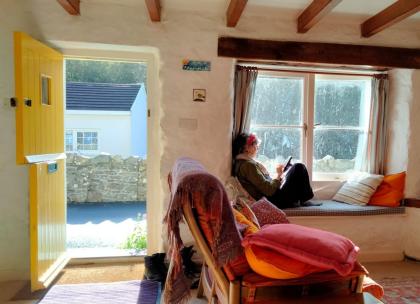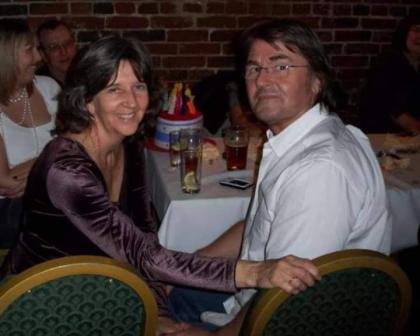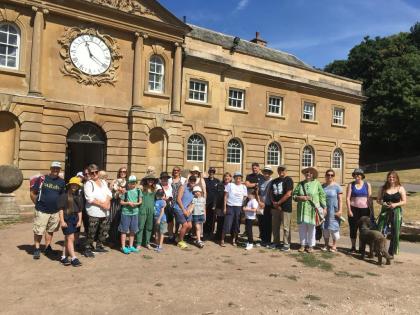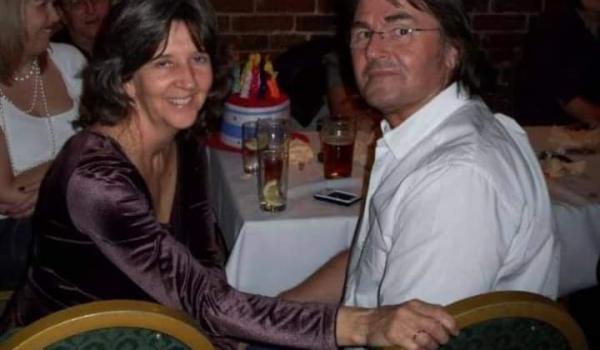I was diagnosed with ovarian cancer in the of autumn 2019. I'd lost some weight which I put down to a busy lifestyle and a family bereavement. I then developed tummy pain and what I thought was a stomach bug, but when it didn't clear up, I went to the GP.
They initially thought it may be IBS, but when they examined me, they thought I may have an aortic aneurysm as my brother had experienced this – and as the common symptoms for this are general belly pain or discomfort, I was referred for an ultrasound.
There was no aortic aneurysm but there was an unidentified mass around my right ovary. I then had a CA125 blood test which was slightly raised and was put on a two-week referral to gynae-oncology.
I had my first surgery a few months later, where they found the cancer was more advanced than they expected. They removed as much of the cancer as they could at this point, and the treatment plan was to have three or four chemotherapies followed by ultra-radical surgery.

When I turned up for my first chemotherapy session they found I had an infected collection behind my bowel which was caused by my surgery. I had fever type symptoms and spikes in my temperature which they had initially put down to a virus. Then an inspired young doctor sent me for a CT scan and there it was, a festering clump in my lower back.
My chemotherapy had to be put on hold while they treated the infection/. Due to where the clump was, they couldn’t put a drain in which would be the usual treatment, instead we had to try antibiotics and hope it worked.
I was admitted to hospital and I spent Christmas in there on intravenous antibiotics. This was really scary as not only was it a delay in the chemotherapy, but we were uncertain of whether this treatment would work. I have a personal faith in a loving God and I trusted that whatever happened it would be alright, that I would be looked after. This is something I have told myself ever since.
Coronavirus
I had my first chemotherapy session on New Year’s Eve 2020, it started at about 8 o’clock at night and finished just as the fireworks were going off. It felt like I was going into the new year with hope.
I was into my third chemo session when covid came along and my treatment plan had to change as there were no intensive care beds for my ultra-radical surgery. We made the decision to carry on with chemo but I was told that it would potentially shrink the cancer cells so much that they wouldn’t be visible in surgery, and some cells would be left behind. This however was my only option.
I finally had my operation at the end of June 2020 on a specially set up, makeshift non-covid intensive care unit. It only had three beds on it. I will always feel grateful that all of this effort was put in for my one small life. I’ll forever be grateful to the NHS.
I had three chemotherapy sessions after the surgery but I responded really badly to the drugs, was hospitalised with diahorrea, which meant sessions had to be delayed. I finally got through them and my scans showed all of the cancer had gone. The plan was for me to start on the cancer maintenance drug niraparib in the next few months.
What’s next
Before I could start niraparib my symptoms started to come back, and a scan showed my cancer had returned. It seems the change in my treatment plan meant some cancer cells slipped the net as expected. There were three professionals in the room when they delivered the news so I knew it wasn’t going to be good. They told me we now had to focus on keeping the cancer under control as opposed to curing it.
I asked for a prognosis and was told we were looking at around 36 – 40 months. Three years I thought, I’ll take that.

Because my tumour is near my bowel I was able to have radiotherapy which is unusual for ovarian cancer. It was at this time that I first saw the word palliative, and this was the first of many moments I grieved and adjusted to new news. My way of coping is to hunker down for a day or so to let the shock settle and tell myself it’s going to be alright.
Since then I’ve had numerous chemotherapies, some radiotherapy, as well as blood and plasma transfusions to manage the side effects of treatment, but there are limited treatment options and I have now exhausted them.
Living
There have been times where treatment has completely wiped me out, and I realised I wasn’t living my life. I reflected on my first year of treatment and realised that despite having an amazing team, I felt like treatment was being done to me, rather than I was part of it.
I realised “I’m here too, it’s not just the doctors and the cancer, I'm here too”. It was then that I made the decision, with the support of my oncologist, to pause treatment so I could go and live, before I died.
Walking is so important to me. I’ve walked daily when I’ve been well enough, and even when I haven’t. Whilst out for one morning walk I was called by my oncology CNS to be told I had a plasma count of 6 and needed to go into hospital.

I’ve explored South Wales, fallen in love with the wildness and beauty of Northumberland, walked parts of St Oswald’s Way, raising money for charity, found a beautiful hideaway in the Peak District, visited Stonehenge at dawn and even made it to Iona.
I've communed with the ancestors, visiting ancient sites and tapping into that continuum of life, of which we're all a part. I’ve made a lifetime of memories with my friends in the past year, and whilst I worried I would fall ill whilst I was away, I thought I would rather die doing this than sitting on the sofa.
The lodger
Right from the beginning I called my cancer the lodger. She moved in, I was trying to evict her, but she wouldn’t go, and she was spreading her stuff all around.
I’ve learnt so much about my body and how resilient it is. I’ve been through so much, but my body has taken care of me and taken me on wonderful adventures. The lodger is with me every day, I can feel her, literally, in the lumps and bumps in my tummy, I’ve never tried to ignore her.
Everyone copes with a cancer diagnosis differently but I decided to live life as much as I could before I died. The lodger has never been the enemy, she has come with me everywhere. I'm in end-of-life treatment now, and I’ve told her, ‘’if I go, you go’’, but she still doesn’t seem to be listening.
If you’ve been affected by this story and would like to speak to a specialist nurse, you can call our dedicated support line on 020 7923 5475 or contact us: [email protected]. We're open from 9am until 5pm, Monday to Friday.
If reading this story has helped you, join the Ovarian Cancer Community to connect with more people affected by ovarian cancer: www.targetovariancancer.org.uk/onlinecommunity



